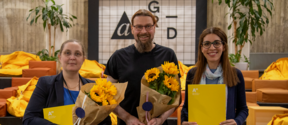Ten years of financial crisis – what is wrong with the banks?

The events of autumn 2008 continue to affect all of our lives. That was when the American financial company Lehman Brothers went bankrupt, and the whole world economy went into a downward slide. Such events had not been seen since the depression of the 1930s, which was also global in its reach.
‘Around 10 years ago, the US entered an economic recession. In Europe, it was thought at first that this was just a headache for the Americans. Soon, however, we Europeans realised that this wasn’t the case, and that the European banks were not as financially sound as we had thought. At that time, the taxpayers and regulators decided that they did not want to end up again in that kind of situation, where the banks had to be bailed out with taxpayers money. Among other things, capital requirements on banks were increased in order to keep them more financially sound,’ Professor Vesa Puttonen says.
In February 2012, it could be seen that several banks were able to raise the required capital. Many banks, however, were in great danger of being unable to achieve this.
Professor Puttonen sees European economies as very bank-centred, which stands in contrast to the American model. America has, of course, a number of big banks, but companies acquire funding also from elsewhere.
‘In Europe, we have got used to the idea that if a company needs money, it goes to the bank. This is the European practice. If the banks are in trouble, then companies can’t get funding from them. In southern Europe this has been a particularly large problem for companies, because their banks have been in a very bad condition. We cannot therefore speak simply of a financial crisis, nor simply of a problem with the banks, but rather of an economic depression that has truly impacted all of our lives during the last 10 years,’ Vesa Puttonen explains.
So what has happened in the banks, Professor Puttonen?
‘The European banks’ stock prices have fallen, while in America they have risen. European banks have had to tie up more owners’ equity in their business operations. Banks have had to add additional capital, and their profitability has weakened. This has particularly been the case for banks engaged in so-called basic banking operations, which means receiving deposits and providing loans. Those banks which have not understood the importance of creating new forms of business, such as asset management, are in trouble. Fortunately, Finnish banks have understood the importance of this, and so they are doing relatively well,’ Puttonen says.
Puttonen: ‘The panellists for the evening are truly a dream team’
‘I could not have obtained better participants for this panel. I am very pleased that these three people, who hold key leadership positions in the financial sector, all accepted the invitation to participate,’ Vesa Puttonen says. The panellists for the Better Business – Better Society seminar, to be held on 7 November at the School of Business, are Jukka Vesala, Timo Löyttyniemi and Esko Aho.
Jukka Vesala DSc (Econ), who completed his PhD at the Helsinki School of Economics, works as the Unit Director for Nordea’s Group Credit Risk Control, where he is responsible for monitoring the credit risk of the Nordea Group. Before this, he worked as Principal Expert in the Financial Stability Division of the European Central Bank and Head of Department at the Finnish Financial Supervision Authority. He has also served on the Management Board of the European Banking Authority and the Audit Committee of the European Investment Bank.
Timo Löyttyniemi DSc (Econ) also completed his PhD at the Helsinki School of Economics, serves as Vice Chair of the EU’s Single Resolution Board (SRB). He has worked in Brussels since 2015, and his five-year term extends to the end of this year. The Single Resolution Board is responsible for resolving issues with banks within banking union area that are facing difficulties. The SRB it is also responsible for the EU’s Single Resolution Fund, which has already accumulated nearly €33 billion through insurance payments made by banks. The target size for the fund is around €60 billion. During his career, Löyttyniemi has also worked as Managing Director of the State Pension Fund.
Esko Aho, who holds the position of Executive in Residence at the School of Business, is Chairman of the Board for both Cinia Oy and Adven Group. He is also a member of the Sberbank Supervisory Board and an advisor for JP Morgan. Aho coordinates domestic and international commissions through Verbatum Oy, which he owns.
For more information about Better Business – Better Society seminar series: https://bit.ly/2BWHrWP
Professor Vesa Puttonen was interviewed by Terhi Ollikainen.
- Published:
- Updated:
Read more news

Towards the transition from the academic world to the professional world
Accounting Masters students had the opportunity to tackle real-life business challenges in the CAPSTONE course in accounting
Civil Engineering invites companies to participate in future development work
A stakeholder event organized by the Department of Civil Engineering has already become a spring tradition. Civil Engineering Day was held on April 25 in Dipoli Otaniemi.
Aalto Open Science Award ceremony brought together Aaltonians to discuss open science
Last week we gathered at A Grid to celebrate the awardees of the Aalto Open Science Award 2023 and discuss open science matters with the Aalto community.